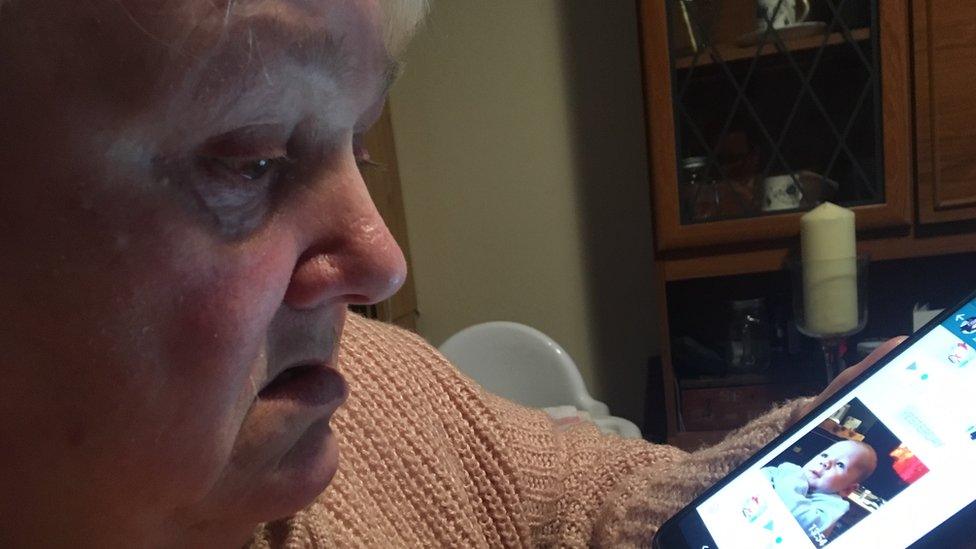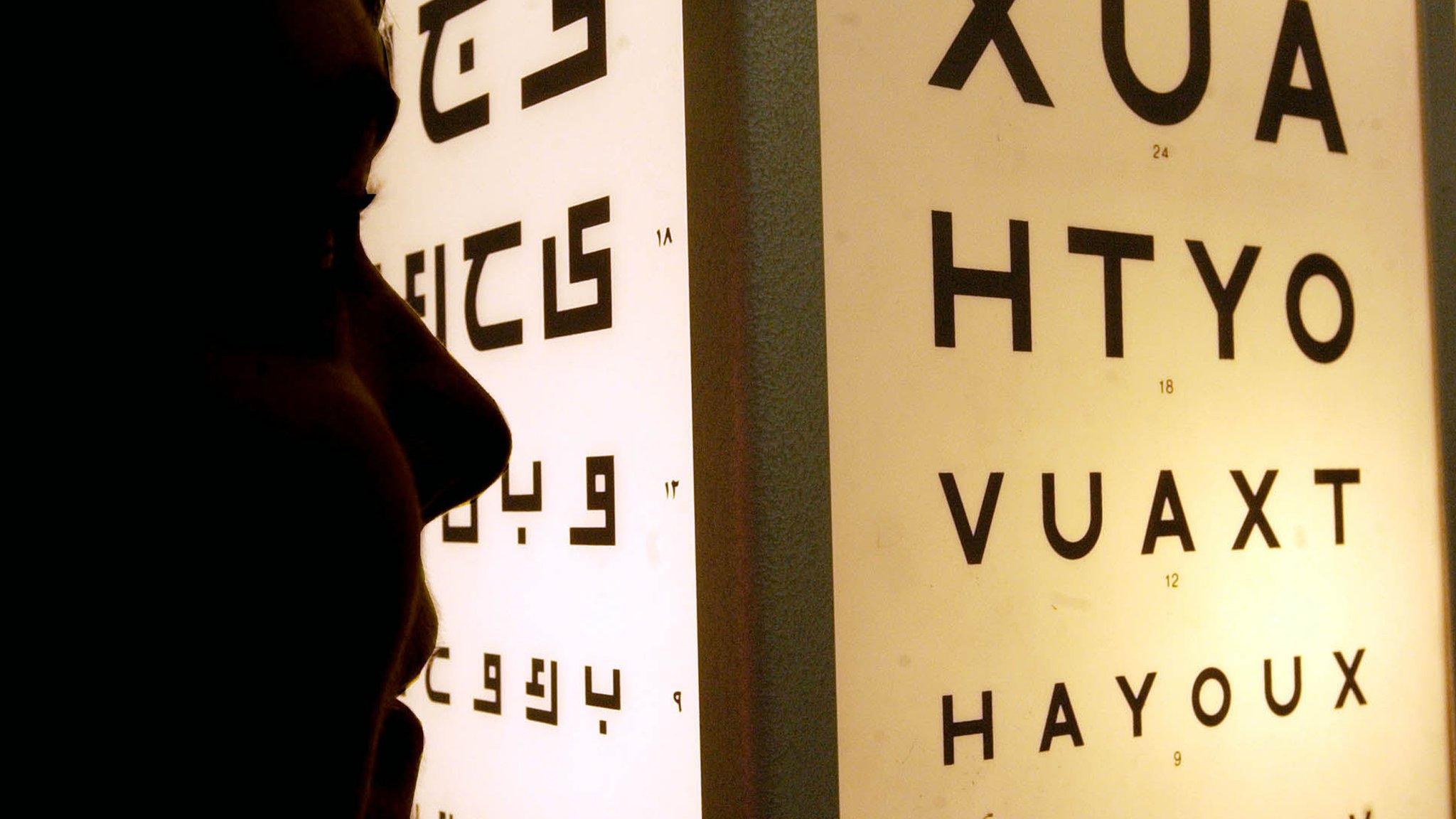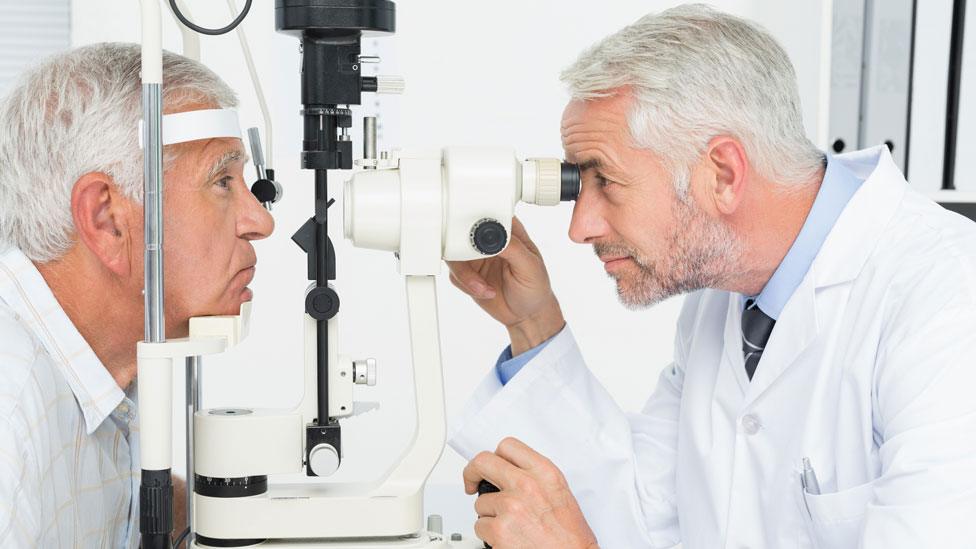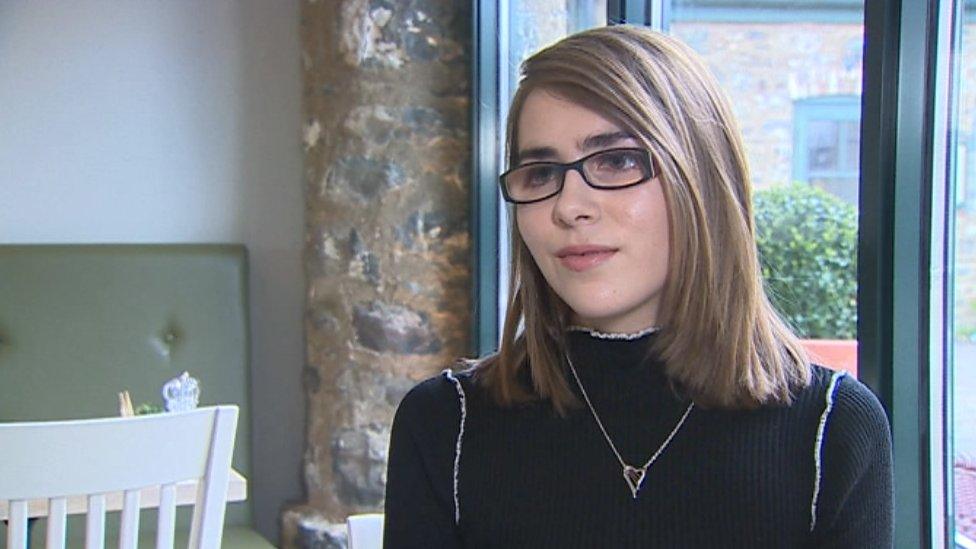Blindness: Wales' eye care waiting times risk sight loss
- Published
Pam Tooky's sight loss means she has never seen her grandson
Almost 35,000 people at risk of permanent sight loss are waiting too long for eye care, according to new statistics from the Welsh Government.
It has introduced a new target aimed at prioritising the most urgent patients and preventing those with treatable conditions losing their sight.
The figures mean almost 35% of all patients in the highest risk category waited longer than the target time.
No health board met the target to see 95% of the most serious cases on time.
The worst-performing health board was Cardiff and the Vale where 48.6% of patients at risk of irreversible sight loss waited longer.
RNIB Cymru described the figures as "extremely worrying" but welcomed the publication of the new measure as a "turning point" in understanding the delays eye care patients face.
The Welsh Government is giving health boards more than £10m to improve eye care services.


Pam Tooky does not know if her sight could have been saved
'My sight is never coming back'
Pam Tooky from Brynmawr, Blaenau Gwent, has macular degeneration, which has left her almost blind.
Mrs Tooky, who is in her 60s, had several cancelled and delayed appointments at Nevill Hall Hospital in Abergavenny last year, but recognised there were problems across Wales and did not blame doctors.
She does not know if her sight could have been saved, had she been seen sooner.
"I have my off days when I sit and scream and moan, but I just think what's the point? It's not going to change what's happened. The sight that's gone is gone, it's never going to come back."

What's new?
The aim is to make sure those at highest risk of blindness get priority treatment and care.
Patients are given a maximum waiting time, according to their level of risk and how urgently they need to be seen.
Ninety-five percent of those in the highest category should not be seen later than 25% beyond their target wait - so a patient given an eight-week target should be seen within 10 weeks.
For the first time the target will include people waiting for follow-up appointments, as well as first-time patients.
Wales is the first UK nation to introduce a target for eye care patients based on the urgency of the condition, alongside the existing referral to treatment target.
This matters because diseases such as glaucoma and age-related macular degeneration can cause permanent blindness, whereas conditions such as cataracts can get worse but do not permanently harm vision.

Why are these changes being introduced?
Sight loss is a growing problem, with the numbers of patients affected predicted to double by 2050.
The NHS is already having trouble keeping up with demand. Ophthalmology has the second-worst waiting times from referral to treatment of all clinical areas, according to the Wales Audit Office, external.
The Welsh Government said it expected to see improvement across Wales.
Health Minister Vaughan Gething said: "It isn't just about saying 'there's a new measure, that will resolve everything'.
"It won't, but it will tell us an honest picture of what we're doing and what we still need to do, and the commitment from me and the government is to invest in the right parts of our service, delivering the right care at the right time."
The first step towards fixing it is knowing exactly how bad the situation is.
How does the Welsh Government plan to improve eye care?
It has given health boards £3.3m to meet the new guidelines, including establishing new community services, training more staff and developing "virtual" clinics via video link.
Another £7m will be spent on digitising patients' eye care records in community clinics and hospitals to connect and speed up the system.
Charities are calling for a long-term plan to address staff shortages and reduce the backlog of patients.
Leading clinicians have welcomed the new target as a step in the right direction.
Dr Gwyn Williams of the Royal College of Ophthalmologists said there had been a 40% increase in the number of appointments in recent years.
"It's like a gigantic snowball rolling downhill," he said.
"But you can't fix a problem until you've measured the problem and the first step towards fixing it is knowing exactly how bad the situation is."
Plaid Cymru's health spokeswoman Helen Mary Jones called the statistics "outrageous" and said it should be a watershed moment for Labour and "the way they mismanage our NHS".
- Published18 September 2013

- Published31 January 2017

- Published22 May 2019

- Published26 March 2019
